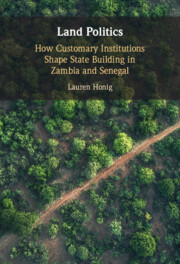Crossref Citations
This Book has been
cited by the following publications. This list is generated based on data provided by Crossref.
Manara, Martina
and
Pani, Erica
2023.
Institutional hybrids through meso-level bricolage: The governance of formal property in urban Tanzania.
Geoforum,
Vol. 140,
Issue. ,
p.
103722.
FERREE, KAREN E.
HONIG, LAUREN
LUST, ELLEN
and
PHILLIPS, MELANIE L.
2023.
Land and Legibility: When Do Citizens Expect Secure Property Rights in Weak States?.
American Political Science Review,
Vol. 117,
Issue. 1,
p.
42.
Harris, Adam S.
and
Honig, Lauren
2023.
Mutual Dependence and Expectations of Cooperation.
The Journal of Politics,
Vol. 85,
Issue. 1,
p.
192.
Wilfahrt, Martha
and
Letsa, Natalie Wenzell
2023.
Judge, landlord, broker, watchman: assessing variation in chiefly duties and authority in the Ghana–Togo Borderlands.
The Journal of Modern African Studies,
Vol. 61,
Issue. 3,
p.
439.
Obeng‐Odoom, Franklin
and
Haila, Anne
2024.
THE POWER OF UNCERTIFIED URBAN LAND.
International Journal of Urban and Regional Research,
Vol. 48,
Issue. 5,
p.
855.
Manara, Martina
and
Regan, Tanner
2024.
Unbundling tenure security and demand for property rights: Evidence from urban Tanzania.
Urban Studies,
Vol. 61,
Issue. 11,
p.
2080.
Robinson, Amanda Lea
2024.
Inventing traditional authority: Lhomwe chiefs in Malawi.
The Journal of Modern African Studies,
Vol. 62,
Issue. 1,
p.
25.
Chen, Xiran
2024.
Chiefs and Pre-Election Violence in Sub-Saharan Africa: The Precolonial Legacy of Centralized States.
International Interactions,
Vol. 50,
Issue. 3,
p.
537.
Saidou, Abdoul Karim
and
Honig, Lauren
2024.
Legitimising regimes and legalising self-defence groups: the case of Burkina Faso's VDPs.
The Journal of Modern African Studies,
Vol. 62,
Issue. 3,
p.
269.
Baldwin, Kate
Kao, Kristen
and
Lust, Ellen
2025.
Is authority fungible? Legitimacy, domain congruence, and the limits of power in Africa.
American Journal of Political Science,
Vol. 69,
Issue. 1,
p.
314.



